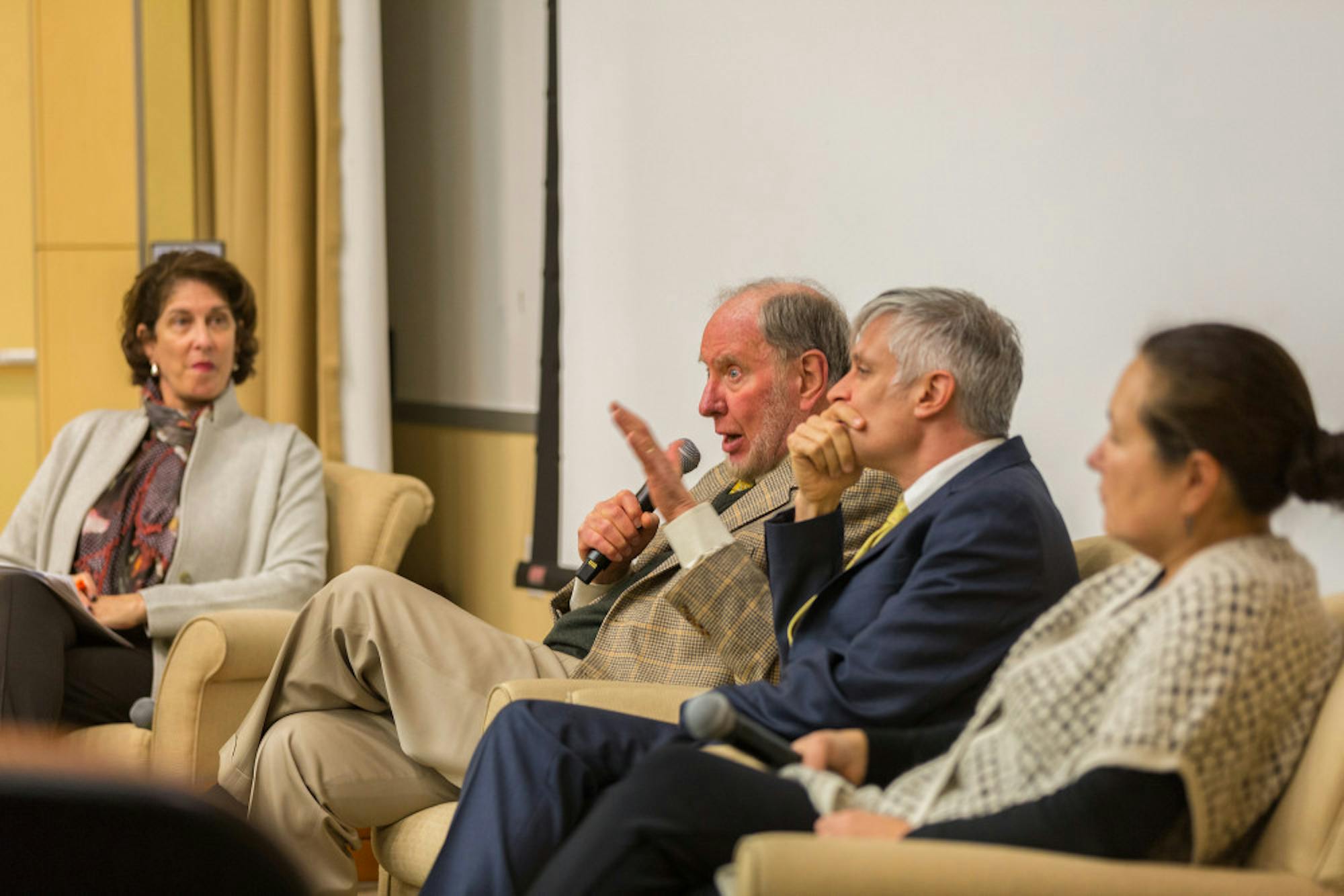Speakers from a variety of fields addressed the current state of civic engagement in the United States at a panel discussion in a mostly-full ASEAN Auditorium last night. The event, entitled "The Civic State of the Union," was part of the Jonathan M. Tisch College of Civic Life’s Distinguished Speaker Series.
The event's panelists were Professor Robert Putnam from the Harvard Kennedy School, Tisch College Associate Dean Peter Levine and Shirley Sagawa, visiting senior fellow at the Center for American Progress, all of whom were familiar with different aspects of the civic landscape. Mara Liasson, the national political correspondent for NPR, moderated the panel.
Tisch College Dean Alan Solomont opened the event with an overview of the Center for Information and Research on Civic Learning and Engagement (CIRCLE)'s latest research. CIRCLE, an initiative of Tisch College, surveyed young voters about their views on politics before and after the presidential election lastNovember, with the goal of studying millennial voters' reactions to the election.
Solomont then began the event and introduced the speakers.
“At tonight's event, we take a step back from considering specific issues and policies in order to examine the broader context of civic and political life in the United States," Solomont said. "Is the civic state of the union strong? And if not, how do we go about strengthening it in these times that challenge our democracy?”
Liasson opened the panel discussion by commenting on the mood of the room.
“There's actually a lot of suspense in the room this evening,” Liasson said. “We don’t know if we’re going to leave here depressed or with little bits of hopefulness about the civic state of the union.”
Liasson went on to contemplate civic society today in relation to President Donald Trump. She described Trump as a “stress test for democratic institutions,” and said that she has been tracking how those institutions — the judiciary, Congress, the media and citizens — have been affected by his administration.
“We’ve seen the studies, young people are losing faith in our democracy,” Liasson said. “On the other hand, look what’s happening. Those town halls are not astroturf … We don't know what exactly to make of these stirrings.”
Liasson’s first question for the panelists asked them to describe the current moment in American politics and civic life in relation to the past.
Putnam spoke about how the internet has shaken up all aspects of civic engagement, in both good and bad ways. He said that the internet can be dangerous because it replaces face-to-face interactions with remoteness, but that the internet can also be beneficial for fostering connection.
“I think that what we’re seeing now, out in the country, is wonderful amalgam of internet-based connections … but also real face to face connections,” Putnam said. “I’m not actually so much impressed by marchers or demonstrators or tweet storms. That’s not what’s going to turn this country around."
According to Putnam, the only way for the country to right itself is through face-to-face organization. The internet, he said, is risky because of its inherent remoteness. He spoke about his findings interviewing young Americans, including one working-class millennial named “Mary Sue,” who Putnam said voted for Trump.
“If we don’t do something about the Mary Sues, we are at risk of having an authoritarian demagogue take over this country,” Putnam said.
In addition to concerns about Trump, the panelists expressed concerns about the state of national service. Sagawa, who remains active in the field, said that people need to shift their views on those who work in the national service sector.
Sagawa added that Americans should be willing to open their doors to those who are serving the country in some capacity. She also spoke about the changing nature of politics within society.
“Now people have a 360-degree view of their cause orientation and their civic participation in the world,” Sagawa said. “You think about what you eat, and it's political what you eat. You think about where you shop, and its political where you shop.”
Levine said that the politicized society, in which the number of choices for news outlets has risen sharply, has given rise to a reality where people become more politicized, or pushed out entirely.
“People who are politically involved make choices that corral them into their specific groups, and a lot of people just choose to avoid politics all together," Levine said.
During a question-and-answer session at the conclusion of the panel discussion, students asked the panelists to share their views on a number of topics, including what role the government should play in closing the socioeconomic gap in internet access.
Putnam said that this digital divide does not stem from a gap in accessibility, but rather in the knowledge of how to use those digital tools productively.
“Its not access to technology,” Putnam said, noting that underprivileged children still have smartphones. “In Silicon Valley, somebody said to me, about a whole string of problems, ‘Yeah, we have an app for that.’ And I said, ‘But these kids don’t have somebody to hug them.'”
NPR correspondent moderates panel on civic life post-election

Medford/Somerville, MA - Robert D. Putnam, Malkin Professor of Public Policy at the Harvard University John F. Kennedy School of Government, shares his views on the current national political climate in Cabot Auditorium on Mar 07, 2017.





